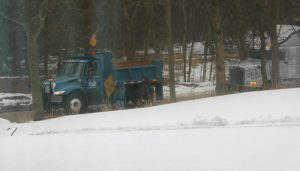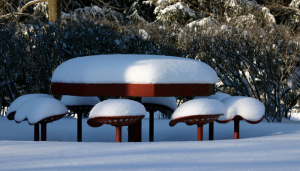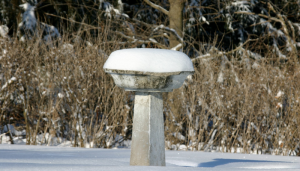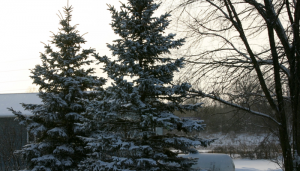
by jphilo | Feb 25, 2008 | Current Events

It doesn’t take long for some authors, when their books are accepted for publication, to develop artistic temperaments. For me, it only took five days.
It started an hour ago. I was settling in to work on my magnum opus, or at least to reply to some weekend emails, when an incessant beeping began outside. You know the sound. The heavy equipment warning beep, which was a little odd since our gravel road isn’t a hotbed of heavy equipment traffic.
At first I kept writing, but after fifteen minutes I could no longer ignore the noise shattering the quiet so necessary for us artist types. I looked outside. All I saw was the dripping rain which has turned our gravel road into a treacherous slippery mess. The beeping continued, so I got up and looked out our big corner window. A full gravel truck was backing along the road in front of our house, followed by a white city pick up truck. Just east of the gravel truck, past our neighbor’s driveway was a semi stuck in the mud, blocking the road.
I grabbed my camera and documented the high-tech maneuvers used to get traffic moving again. First, the gravel truck dumped a bit of its load in front of the semi. Then two city workers hopped out of the pick up and rustled around in the truck bed. Eventually they hauled out two shovels. Now this was the tricky, high-tech part. The city workers handed the shovels to the men who had been in the semi. Those men shoveled dirt under the semi’s tires and in two minutes, they were able to get the thing moving again.
The entire incident ended with a little parade as the gravel truck drove past our house, followed by the semi, followed by the white pick up. Very festive, though a marching band would have added a nice touch. But by then, the rain had turned to snow, and we all know that below freezing temperatures are hard on musical instruments.
Not that I’m complaining about the cold or the six to eight inches of snow predicted for tonight. I don’t complain about the weather, even though it did cause the road conditions which caused the ruckus which disturbed the quiet I need to write my book.
But since I can’t control the weather and refuse to complain about it, I’ll do the next best thing. I’ll get rid of all distractions – shut the curtains, put in my ear plugs – you name it, I’ll do it.
After all, people are waiting for my magnum opus. I refuse to disappoint them.

by jphilo | Jan 24, 2008 | Family

I know, I know. I’ve been stuck on snow lately. But we haven’t had a really snowy winter for a long time so you’ll have to bear with me. Anyway, today’s subject isn’t snow. The subject is the picnic table seats under the snow and the memory they brought to mind.
The seats, which are old tractor seats mounted on metal pipes sunk in concrete, made me think of my Great-uncle Burnell. He was, to put it kindly, a character. That’s the euphemism for people who say whatever they want, do whatever they want to do and don’t care what other people think. That pretty much describes Uncle Burnell.
When we first moved to this house on the gravel road Burnell fired up his big conversion van and drove over, with his wife Ginny and her sister Gladys, to see our new place place. The curtains in the living room caught Aunt Ginny’s eye. “You mean to say, they came with the house? My land.”
Aunt Gladys was concerned about the size of the house. “My land, Jolene, how’s you ever going to keep up with a place like this. Look at all them windows to wash.”
Uncle Burnell zeroed in on the picnic table seats. “Them’s valuable, you know. They don’t make stuff like that no more. You better be careful or somebody could steal them.”
The last time Burnell and Ginny and Gladys were here was for Thanksgiving six or seven years ago. My husband and brother-in-law drove over and picked them up because Burnell was in the early stages of Alzheimer’s, Ginny never learned to drive and Gladys couldn’t see over the steering wheel.
When they got here, Burnell didn’t care about the tractor seats. Instead he unzipped his pants and peed on the grass. Then he came in the house. “Mighty nice a you to do this. Mighty nice a you to fix a meal like this. I’m gonna give you six hundred dollars for doin’ it, maybe even a million dollar bill. You ever seen a million dollar bill?”
Ginny and Gladys couldn’t get over the tablecloth and the napkins. “Will you look at them? They match. My land, I never seen anything like it.”
Burnell and Ginny and Gladys are dead now, after living long and colorful lives. But seventeen years after we moved in, the tractor seats are still here. I look at them, covered with snow, and find comfort. Because in my memories, Burnell and Ginny and Gladys are still here, too.

by jphilo | Jan 22, 2008 | Daily Life

A glance at the side yard through the dining room door made me smile. Snow covered the top of the old birdbath. I admired the perfectly shaped mound for a moment. It caught my eye later as I lugged groceries into the house. But it wasn’t until I put the apples into the crock pot and saw the birdbath again, this time from the kitchen window, that I understood what I was seeing. White grace on a still, cold morning.
For years I rushed to work and didn’t see the grace. Even on days when school started two hours late, like it did today, I went to school early to prepare, to be ready to give my students what they needed and deserved. All day long I pushed aside the ideas inside my head, the stories that begged to be written down. By the time I got home at night and cared for my family, I’d forgotten the words. Still grace was at work, but when I slowed down enough to see it, I fell asleep instead.
Four years ago, when an opportunity arose to pursue the ideas and stories that had survived my neglect, I left teaching. It took a while, but eventually I remembered the words I’d forgotten. I learned to put the words together so people could understand them. I grew to cherish the time I’ve been given to do so. I slowed down and began to dream and imagine again. This morning, I slowed down enough to marvel at a gift I’d ignored too long.
White grace, undeserved and beautiful, perched on the birdbath.
Thank You, Father.

by jphilo | Jan 17, 2008 | Daily Life

It snowed in the night, while I was sleeping. I woke to a changed world. This morning the yard glitters with three inches of soft, white coldness covering every blemish. I hated to mar that smooth perfection, but scooped a small path to the garage. Then I put the shovel away and went inside, determined to enjoy the beauty before it melted away.
While I ate breakfast I noticed the spruce trees in the back yard, their tips dusted with snowflakes. Every few minute a bit of snow fell from a branch and exploded in the silent breeze. I looked at the trees and wondered, as I have so often in the past year, when they grew so large.
Hiram and I planted four blue spruces when our children were little. Allen was about ten, and Anne was four. The trees were tiny, less than a yard tall when Hiram dug holes and the kids and I dragged the hose from hole to hole. We never watered the trees again, just trusted their roots to find water and their branches to soak up the sunshine.
The trees are so tall now, and I marvel. When did their branches grow strong enough to bear the weight of the snow? And when did my children learn to stand and accept the weight of adulthood?
It happened in the night, I think, while I was sleeping.





